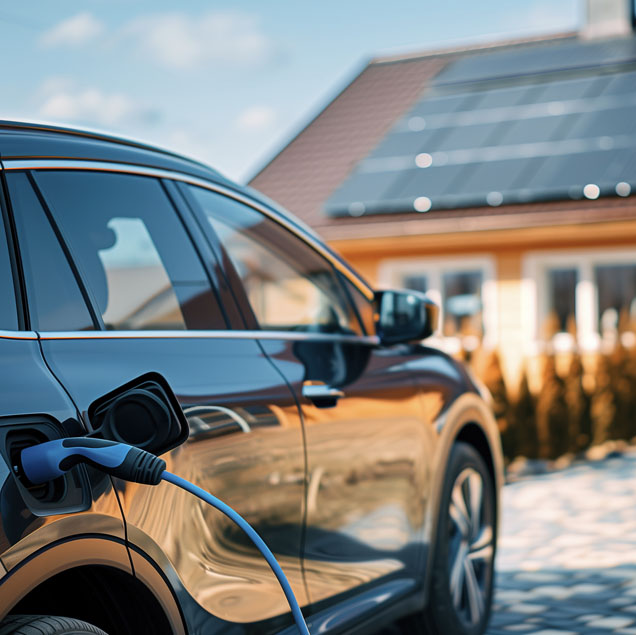Although the idea of managing energy dates back to the 20th century, it was only during the 1970s that the urgency for greater efficiency took centre stage, leading to the development of programmable thermostats. As digital technology progressed, thermostats became more innovative and more intelligent. Today, Home Energy Management Systems use advanced technologies to optimise energy consumption and integrate renewable sources such as solar power. Central to this evolution are electricity meters, which provide crucial data to help HEMS monitor energy consumption and adjust settings for maximum efficiency, reducing costs and our carbon footprint.
From basic thermostats to Home Energy Management Systems
You are mistaken if you think home energy management has only been around for the last few decades. The concept of managing energy consumption has been around since the last century, be it in the simple form of thermostats that allow you to control the temperature in your home manually. During the energy crisis in the 1970s, the need for more efficient energy use became urgent, leading to the development of programmable thermostats. At the start of the digital age, thermostats became more sophisticated, and this was also the beginning of more automated systems.
The real boost in the growth of HEMS began in the 2010s with the introduction of smart technology and the Internet of Things (IoT). The development of smart thermostats and other smart home devices offered even more control and efficiency. Today, advanced Home Energy Management Systems use AI and machine learning, can perform comprehensive analytics, and can be integrated with renewable resources and smart grids, making the systems of enormous added value in any sustainable and modern household.
Why are Home Management Systems becoming so popular?
Home Energy Management Systems are becoming increasingly popular for households, and it is not hard to see why. As energy costs continue to rise, many people are looking for ways to reduce their living expenses. HEMS offers a smart solution that optimises energy consumption and reduces waste. At the same time, increasing awareness of climate change and the need to reduce the carbon footprint is causing more people to make their homes more energy-efficient and sustainable. Thanks to advances in smart technology and the Internet of Things (IoT), managing energy consumption has never been easier and more intuitive, with real-time monitoring and control at your fingertips. Many HEMS can also be seamlessly integrated with renewable energy sources such as solar panels and home batteries, allowing households to maximise their use of clean energy while reducing reliance on the national grid. Moreover, government incentives for energy-efficient home improvements make investing in HEMS even more appealing for people looking to make their homes greener and more cost-effective in the long term.
What is a Home Energy Management System?
A Home Energy Management System is an advanced technology that helps households take control of their energy consumption, making it easier than ever to optimise efficiency and reduce costs. A HEMS provides a detailed picture of how energy is used throughout the home by continuously monitoring the energy consumption of a range of appliances, from home appliances to heating and cooling systems. This real-time tracking enables residents to make smarter decisions about their energy consumption. For example, you can set schedules to turn appliances on or off at certain times or adjust your thermostat remotely to ensure energy is only used when it is needed. But it doesn't stop there: HEMS also uses advanced algorithms to optimise energy consumption, reducing your bills and minimising your carbon footprint. Many systems can also be integrated with renewable energy sources, such as solar panels and home batteries, so you can make the most of clean energy and reduce your dependence on the grid. With easy-to-use apps and dashboards, HEMS offers real-time insight into your energy habits so you can easily monitor your consumption and make your home more sustainable and cost-effective.
The crucial role of electricity meters for a Home Energy Management System
An electricity meter is crucial in effectively operating a Home Energy Management System. It provides valuable support in optimising energy consumption. One of the most essential features of an electricity meter is its ability to provide real-time data on household energy consumption. This continuous flow of information allows the HEMS to monitor patterns in energy consumption and identify areas where efficiency can be improved. By analysing this data, the system provides valuable insights into which appliances or systems consume the most energy. It allows homeowners to make more informed decisions about their energy habits, such as switching to more energy-efficient appliances or adjusting usage patterns.
Electricity meters also enable automation within the HEMS, allowing heating, cooling or lighting settings to be adjusted based on real-time energy consumption data, user preferences and external factors such as weather conditions. This level of automation ensures that energy is used when needed, reducing waste and lowering costs. Moreover, meters track the production and consumption of renewable energy from solar panels, allowing HEMS to optimise clean energy and ensure that excess energy is stored or used efficiently.
In addition, electricity meters support demand response programmes, allowing the system to shift energy consumption during peak periods to reduce pressure on the grid and lower electricity bills. By monitoring energy consumption so accurately, electricity meters enable HEMS to implement effective energy-saving strategies, leading to significant cost savings over time. Integrating a meter with a HEMS takes residential energy management to the next level, making homes more energy-efficient, cost-effective and sustainable.
What does the future hold for Home Energy Management Systems?
Home Energy Management Systems' future will be exciting and transformative as emerging trends reshape how we manage energy in our homes. One of the most promising developments is the increasing integration of renewable energy sources such as solar and wind power. As more households adopt these clean technologies, HEMS will enable more intelligent and sustainable energy use, allowing households to favour renewable energy over grid electricity. In addition, advances in energy storage solutions, such as more efficient batteries, will allow homeowners to store and use excess renewable energy when demand is high or when renewable generation is low.
Thanks to innovations in electricity meters and IoT devices, future HEMS will also have more advanced energy monitoring and management capabilities. These systems will provide real-time data, giving households a detailed understanding of their energy consumption and allowing them to make more informed decisions to reduce waste and lower their bills. Artificial intelligence (AI) will take energy management to the next level by providing predictive analytics, optimising energy storage, and even predicting renewable energy production to ensure resource efficiency.
The rise of smart appliances will further improve home energy management, with devices such as thermostats, lighting and heating systems adapting their operation based on user habits and energy availability. These systems will be fully integrated with HEMS, making them more intuitive and efficient. Homes will also become more 'grid-flexible', meaning they can both consume and deliver energy back to the grid, helping to balance supply and demand, especially during peak hours.
inepro Metering offers an extensive portfolio of electricity meters to manage your energy consumption. If you have questions or would like more information about our metering solutions, please feel free to use the contact form.










